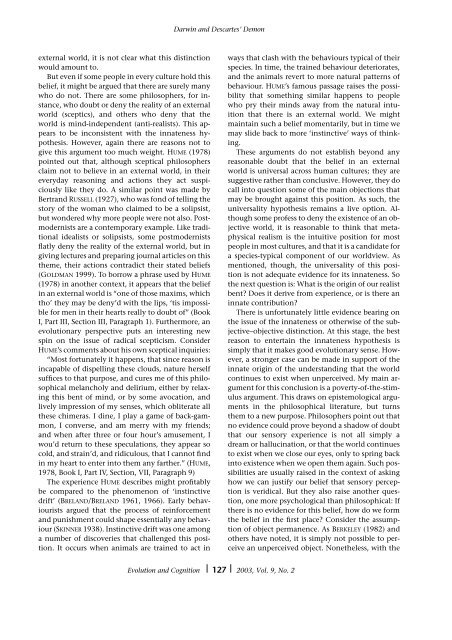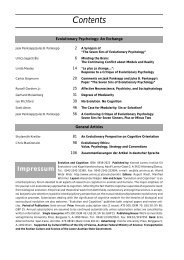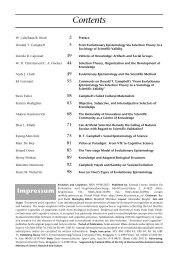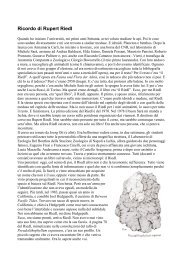Contents - Konrad Lorenz Institute
Contents - Konrad Lorenz Institute
Contents - Konrad Lorenz Institute
Create successful ePaper yourself
Turn your PDF publications into a flip-book with our unique Google optimized e-Paper software.
Darwin and Descartes’ Demon<br />
external world, it is not clear what this distinction<br />
would amount to.<br />
But even if some people in every culture hold this<br />
belief, it might be argued that there are surely many<br />
who do not. There are some philosophers, for instance,<br />
who doubt or deny the reality of an external<br />
world (sceptics), and others who deny that the<br />
world is mind-independent (anti-realists). This appears<br />
to be inconsistent with the innateness hypothesis.<br />
However, again there are reasons not to<br />
give this argument too much weight. HUME (1978)<br />
pointed out that, although sceptical philosophers<br />
claim not to believe in an external world, in their<br />
everyday reasoning and actions they act suspiciously<br />
like they do. A similar point was made by<br />
Bertrand RUSSELL (1927), who was fond of telling the<br />
story of the woman who claimed to be a solipsist,<br />
but wondered why more people were not also. Postmodernists<br />
are a contemporary example. Like traditional<br />
idealists or solipsists, some postmodernists<br />
flatly deny the reality of the external world, but in<br />
giving lectures and preparing journal articles on this<br />
theme, their actions contradict their stated beliefs<br />
(GOLDMAN 1999). To borrow a phrase used by HUME<br />
(1978) in another context, it appears that the belief<br />
in an external world is “one of those maxims, which<br />
tho’ they may be deny’d with the lips, ‘tis impossible<br />
for men in their hearts really to doubt of” (Book<br />
I, Part III, Section III, Paragraph 1). Furthermore, an<br />
evolutionary perspective puts an interesting new<br />
spin on the issue of radical scepticism. Consider<br />
HUME’s comments about his own sceptical inquiries:<br />
“Most fortunately it happens, that since reason is<br />
incapable of dispelling these clouds, nature herself<br />
suffices to that purpose, and cures me of this philosophical<br />
melancholy and delirium, either by relaxing<br />
this bent of mind, or by some avocation, and<br />
lively impression of my senses, which obliterate all<br />
these chimeras. I dine, I play a game of back-gammon,<br />
I converse, and am merry with my friends;<br />
and when after three or four hour’s amusement, I<br />
wou’d return to these speculations, they appear so<br />
cold, and strain’d, and ridiculous, that I cannot find<br />
in my heart to enter into them any farther.” (HUME,<br />
1978, Book I, Part IV, Section, VII, Paragraph 9)<br />
The experience HUME describes might profitably<br />
be compared to the phenomenon of ‘instinctive<br />
drift’ (BRELAND/BRELAND 1961, 1966). Early behaviourists<br />
argued that the process of reinforcement<br />
and punishment could shape essentially any behaviour<br />
(SKINNER 1938). Instinctive drift was one among<br />
a number of discoveries that challenged this position.<br />
It occurs when animals are trained to act in<br />
ways that clash with the behaviours typical of their<br />
species. In time, the trained behaviour deteriorates,<br />
and the animals revert to more natural patterns of<br />
behaviour. HUME’s famous passage raises the possibility<br />
that something similar happens to people<br />
who pry their minds away from the natural intuition<br />
that there is an external world. We might<br />
maintain such a belief momentarily, but in time we<br />
may slide back to more ‘instinctive’ ways of thinking.<br />
These arguments do not establish beyond any<br />
reasonable doubt that the belief in an external<br />
world is universal across human cultures; they are<br />
suggestive rather than conclusive. However, they do<br />
call into question some of the main objections that<br />
may be brought against this position. As such, the<br />
universality hypothesis remains a live option. Although<br />
some profess to deny the existence of an objective<br />
world, it is reasonable to think that metaphysical<br />
realism is the intuitive position for most<br />
people in most cultures, and that it is a candidate for<br />
a species-typical component of our worldview. As<br />
mentioned, though, the universality of this position<br />
is not adequate evidence for its innateness. So<br />
the next question is: What is the origin of our realist<br />
bent Does it derive from experience, or is there an<br />
innate contribution<br />
There is unfortunately little evidence bearing on<br />
the issue of the innateness or otherwise of the subjective–objective<br />
distinction. At this stage, the best<br />
reason to entertain the innateness hypothesis is<br />
simply that it makes good evolutionary sense. However,<br />
a stronger case can be made in support of the<br />
innate origin of the understanding that the world<br />
continues to exist when unperceived. My main argument<br />
for this conclusion is a poverty-of-the-stimulus<br />
argument. This draws on epistemological arguments<br />
in the philosophical literature, but turns<br />
them to a new purpose. Philosophers point out that<br />
no evidence could prove beyond a shadow of doubt<br />
that our sensory experience is not all simply a<br />
dream or hallucination, or that the world continues<br />
to exist when we close our eyes, only to spring back<br />
into existence when we open them again. Such possibilities<br />
are usually raised in the context of asking<br />
how we can justify our belief that sensory perception<br />
is veridical. But they also raise another question,<br />
one more psychological than philosophical: If<br />
there is no evidence for this belief, how do we form<br />
the belief in the first place Consider the assumption<br />
of object permanence. As BERKELEY (1982) and<br />
others have noted, it is simply not possible to perceive<br />
an unperceived object. Nonetheless, with the<br />
Evolution and Cognition ❘ 127 ❘ 2003, Vol. 9, No. 2








